What difference does faith make when it comes to technology entrepreneurship?
This talk answers the question by comparing and contrasting Jeff Bezos’ wisdom with Biblical wisdom. By considering the commonalities, we discover what’s still missing, pointing us to the ways faith makes a difference in our pursuit of technology entrepreneurship.
Note: The manuscript and slides below are from a talk delivered at the “Vocational Thriving in a Changing World” conference in Seattle, WA on May 5th, 2018. Full slides are available here.
Outline:
1. Is Bezos Biblical?
2. What’s missing
3. TheoTech’s Magic Quadrant
4. How Faith Makes A Difference
Is Bezos Biblical?
About two weeks ago, Jeff Bezos–the founder of Amazon and the richest man in the world–received the Axel Springer Award for his innovative achievements in e-commerce and digital journalism. During the corresponding interview Bezos talked about: “leaving a steady Wall Street job to start Amazon, why his rocket company Blue Origin is his most important project, and what it’s like to have Trump as your biggest critic”.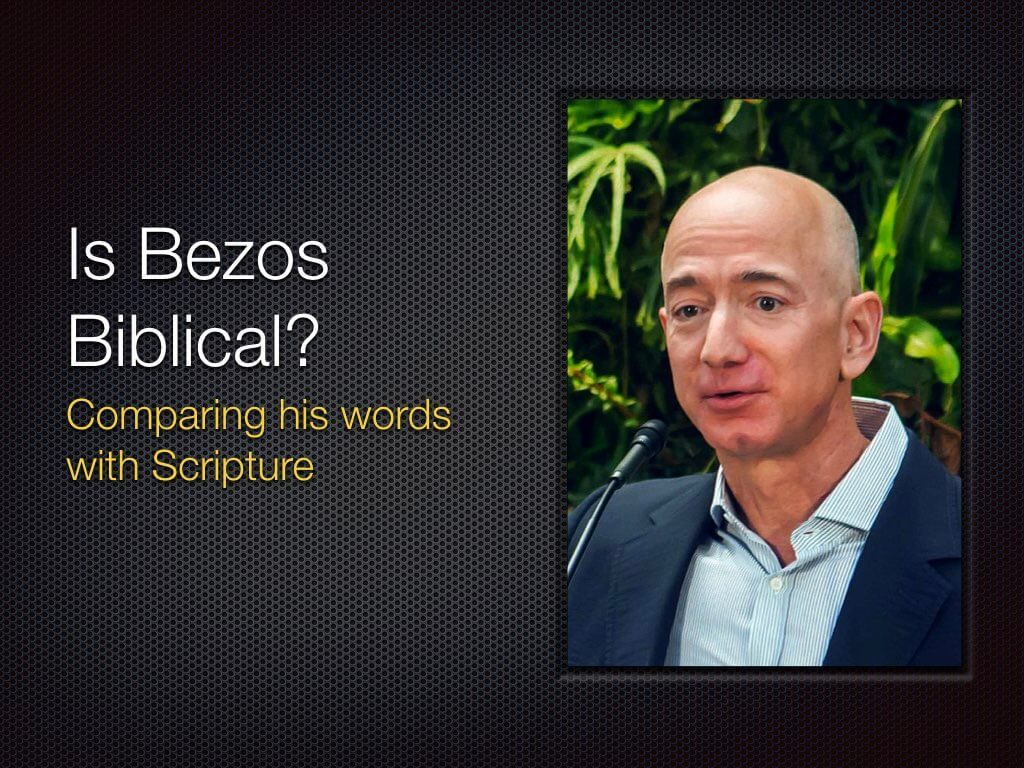
Here’s what he had to say about a few topics relevant to our conference today:
First, when was asked how he was able to leave his cushy Wall Street job to do a startup, here’s what he said:
when you have loving and supportive people in your life like Mackenzie [his wife], my parents, my grandfather, my grandmother, you end up being able to take risk because I think…you kind of know somebody’s got your back and so it’s just an–I don’t even think you’re thinking about it logically–it’s an emotional thing.”
…
“So I think it’s, anyway, I won that lottery, I won that lottery of having so many people in my life who have given me that unconditional love
Interesting. Jeff Bezos says that the unconditional love of his family and community were the key to his risk-taking.
What could this mean for Christians who confess the unconditional love of God?
Shouldn’t we be unleashed to think big and to take big risks for God’s Kingdom?
And if we aren’t, what does it say about the love in our churches and our personal experience of God’s love?
Second, let’s talk about criticism. Here’s what Bezos said about being criticized:
“Well, first of all, with any criticism, my approach to criticism and what I teach and preach inside Amazon is when you’re criticized, first look in a mirror and decide are your critics right? If they’re right, change, don’t resist.”
Interesting. Doesn’t this sound a lot like biblical wisdom? For example, Proverbs 15:31-32 says:
Whoever heeds life-giving correction will be at home among the wise.
Those who disregard discipline despise themselves, but the one who heeds correction gains understanding.
How about generosity? Bezos is the richest man in the world, surely he could be doing so much more to help others? Some of his critics are pretty unhappy with how he uses his money.
Well, here’s how Bezos responded:
I’m finding I’m very motivated by the here and now…when you go study homelessness, there are a bunch of causes of homelessness. Mental incapacity issues are a very hard-to-cure problem, serious drug addiction, a very hard-to-cure problem, but there’s another bucket of homelessness which is transient homelessness, which is a woman with kids, the father runs away, and he was the only person providing any income and they have no support system, they have no family. That’s transient homelessness. You can really help that person. And you by the way, only need to help them for like six to nine months, you get them trained, you get them a job, they’re perfectly productive members of society.
Whatever critics may say, they can’t deny that his pragmatic and short-term approach to giving is reasonable. In fact, it resonates with what the Apostle Paul said he wanted Christians to do in his letter to Titus (3:14):
“And let our people learn to devote themselves to good works, so as to help cases of urgent need, and not be unfruitful.”
Lastly, here’s what Bezos had to say about something very important to a lot of Christians in the tech industry in particular… on work-life balance:
…this work-life harmony thing is what I try to teach young employees, actually, and senior executive[s] at Amazon too, but especially the people coming in. We’re asked about work-life balance all the time and my view is that’s a debilitating phrase because it implies there’s a strict trade off and the reality is if I’m happy at home, I come into the office with tremendous energy, and if I’m happy at work, I come home with tremendous energy. And so it actually is a circle, it’s not a balance. And I think that that is worth everybody paying attention to. You never want to be that guy…who as soon as they come into the meeting they drain all of the energy out of the room. You can just feel the energy level go whoof …you want to come into the office and give everybody a kick in their step.”
Some people may cynically think work-life harmony is an excuse for overwork and I’m guessing Bezos doesn’t intentionally rest on a Sabbath day, but even this response has echoes of Biblical wisdom, for example Proverbs 11:25 says:
A generous person will prosper; whoever refreshes others will be refreshed.
So what’s the point? Why do I point out the resonances between Bezos’ words and Biblical wisdom?
It’s twofold.
First, I want to show how much the capital “c” Church–of which I am a member–can learn from leaders in the tech industry. Not to overstate it, but I fear complacency, cowardice and incompetence in the Church has damaged the cause of Christ more than persecution.
- We’re more ambitious for our careers and salaries than we are for God’s Kingdom.
- We tolerate ineffectiveness and laziness in Christian community that would be unacceptable in the professional world.
- We forget rigor, due diligence, and accountability when it comes to Christian leaders and causes only to get blindsided by scandal and mismanagement.
- We uncritically assume our activities are aligned with God’s Kingdom so we can focus on pursuing our own comforts, interests and definitions of success.
- We forgo Biblical sacrifice and suffering, believing worldly methods can accomplish God’s will.
- We seek fame, riches and recognition for ourselves, thinking we can use it as a platform to glorify God.
I don’t like speaking this way. It’s hard to be vocally self-critical.
I know it doesn’t equally apply to everyone and that there are nuances in every person’s situation. But I’ve spoken in these terms to drive home the point that we as the Church have much to learn and much room to grow.
If technology’s power can be so effectively harnessed by entrepreneurs like Bezos to deliver spectacular shareholder value and reshape our entire world, shouldn’t it be intentionally and effectively leveraged to advance the Gospel?
The Gospel is not a hobby or a community service project. The Gospel is God’s power to save the world. If we can make our greatest strengths productive for companies in the marketplace, how can we make them productive for the Gospel too?
Which leads to my second point. In all of the biblical wisdom espoused by Jeff Bezos, what’s missing?
What’s missing in Bezos’ wisdom?
Bezos doesn’t make any reference to the Bible, God, Jesus, the Gospel, or the church, yet his answers resonate with biblical wisdom. Can we just follow what he says?
What does faith have to do with any of it? What does the Bible have to meaningfully say about technology and entrepreneurship beyond what he’s said?
To think about this question, I want to share with you this diagram I made that has helped me think about vocational integration. If you’ve heard of Gartner’s Magic Quadrant, maybe you could call this “TheoTech’s Magic Quadrant for Faith-based Vocational Integration”.
TheoTech’s Magic Quadrant
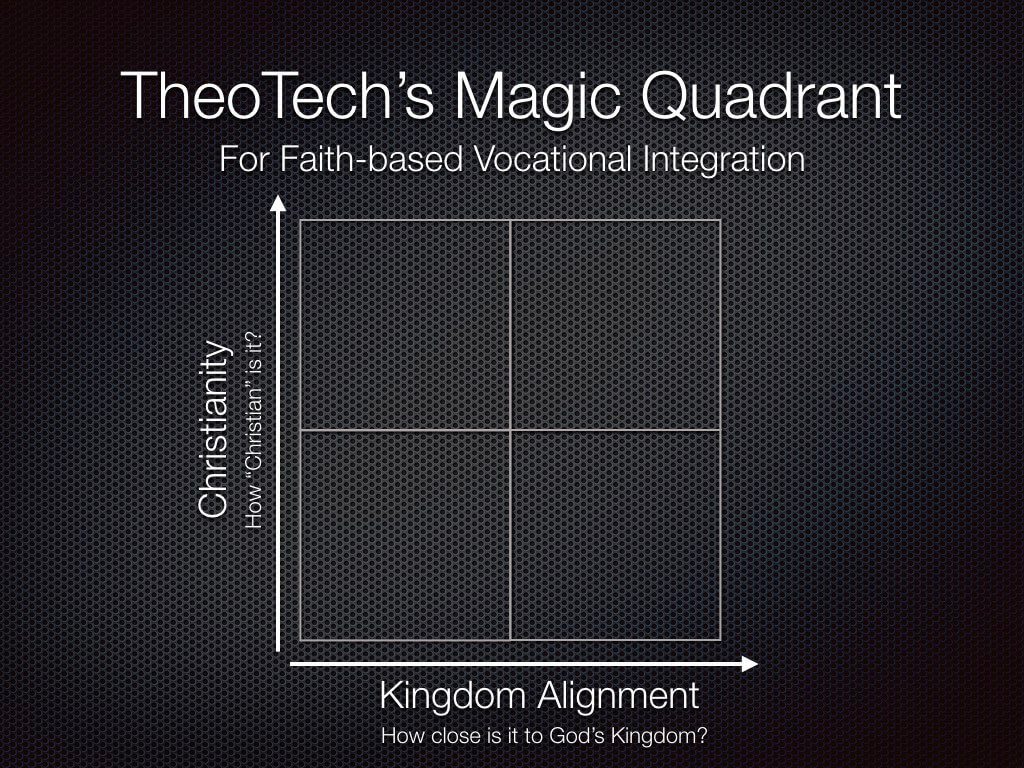 On one dimension you have a range from explicitly non-Christian to explicitly Christian. On the other dimension, you have a range from the Kingdom of this World to the Kingdom of God.
On one dimension you have a range from explicitly non-Christian to explicitly Christian. On the other dimension, you have a range from the Kingdom of this World to the Kingdom of God.
The reason why this diagram is helpful for me is that it keeps me from making the mistake of collapsing the two dimensions.
Growing up in church, it’s really easy to mistake everything Christian with God’s Kingdom and everything non-Christian with the world.
But it only takes a little bit of experience to know how much sin, incompetence, deception and abuse happens in the Christian sphere. And it only takes a little bit of experience to discover how much justice, creativity and good there is in the non-Christian sphere.
The church has suffered great harm from the collapse of these two dimensions because it has cut it off from a lot of godly wisdom simply because it lacked the Christian label, while simultaneously embracing worldly practices simply because they were labeled Christian.
By putting each dimension on its own axis, we end up with 4 quadrants. Here’s how I’ve labeled them.
In the top left, we have explicitly Christian appearances, but beliefs and practices that are actually aligned with the Kingdom of the World. When we find laziness, cowardice, injustice and deception in quadrant 1, we are in the Hypocritical quadrant.
Below that we have the non-Christian realm intersecting with the Kingdom of the World. This is evil in its most obvious forms. For example sex trafficking. There’s nothing redemptive about it because it violates the God-given worth of its victims, abuses their sacred sexuality and robs them of their freedom.
This is the Disintegrated quadrant.
To the right we have the non-Christian realm intersecting with the Kingdom of God.
This is the “Aligned” or “Common Good” quadrant. I might place the philanthropic work of the Bill and Melinda Gates Foundation to alleviate global poverty here for example.
And above that we have the Integrated quadrant.
This is where the opening lines of the Lord’s prayer are fulfilled. Not only is God’s will practiced in justice, righteousness and steadfast love, or God’s creativity reflected in wonderful inventions, but God’s name is also explicitly hallowed.
By putting “How close is it to the Kingdom of God” on a different axis than “How Christian is it?” we have a category for all the ungodly things that happen in explicitly Christian contexts. We also have a category for all the glorious and good things that happen in explicitly non-Christian contexts. And as Christians in any context we can discern the “True North” of God’s Kingdom and actively move things in that direction.
Applying the Magic Quadrant
Let’s look at a few examples of how to use these quadrants.
How many of you have heard of Theranos?
Theranos is a startup founded in 2003 that claimed to revolutionize medical testing through new technology that could run comprehensive tests on just a few drops of blood. This would make medical testing incredibly affordable for the masses. The founder was a brilliant storyteller. Widely praised by the press, Theranos eventually raised $700 million at a $9 billion valuation. It sounds fantastic, the kind of company that would fall under the “Kingdom Aligned”/“Common Good” quadrant.
But in March of 2018, the Securities and Exchange Commission charged the company with defrauding investors by lying about the company’s technology and business performance. It turned out the tech was a total failure and today its value is virtually nil. Not only were investors swindled, but thousands of people who used the unreliable technology may have been misdiagnosed and harmed.
If you were a whistleblower in such a company, Christian or not, your actions would have aligned with God’s Kingdom and pushed the company towards the Aligned quadrant.
For a second example: How many of you have experienced a church scandal or at least a serious church conflict?
Isn’t it scary when God’s Word and Christian religiosity are used to cover up lies, protect abusers, or swindle people out of their money?
When you stand for the truth in such situations, perhaps at great personal cost to your relationships and reputation, you’re pushing things away from the hypocritical, worldly quadrant and towards the Integrated quadrant. You’re fulfilling Jesus’ description of being salt and light.
Alright, so this is how I think these quadrants can show us what’s missing in Bezos’ wisdom.
The biblical resonances in Jeff Bezos’ thinking exist in the “Kingdom Aligned” quadrant. That’s what makes it so insightful and effective. It’s not explicitly Christian or Gospel-oriented, but as Christians we affirm and learn from it. It reflects God’s wisdom and simply acknowledging God as its source would move it towards the Integrated column.
However, it’s not enough for us as Christians to stay in the “Aligned” quadrant. If we do, we get stuck in our faith.
If the most we can say about being a Christian engineer is “be a competent and honest engineer”, then the Christian adjective doesn’t really make a difference.
Many people want to do good, find meaning and purpose in work, express their creativity, make good money, and serve with excellence. It’s all well and good, but to paraphrase Jesus’ words in Matthew 5: “If you’re just as good as everybody else, what’s the point? … Be perfect, therefore, as your heavenly Father is perfect.”
We live in a post-Christian context. If your faith has nothing meaningful to add, maybe we’d be better off just going to top tech conferences like AWS:Reinvent or Google I/O. Maybe we’d be better off learning leadership from Jeff Bezos than pastors. Maybe we’d be better off creating the wildly successful startups of tomorrow rather than investing in church planting.
But I hope to show you, as this diagram makes clear, that these options are not mutually exclusive and that faith does make a big difference–if we’re willing to act on it.
How Faith Makes a Difference
So how does faith make a difference? Here are three ways that I see faith making a difference for technology entrepreneurship.
| #1: Faith makes God your ultimate customer |
| #2: Faith makes eternal salvation your ultimate exit strategy |
| #3: Faith makes God’s Kingdom your ultimate vision and mission |
Faith makes God your ultimate customer
First, faith makes God your ultimate customer.
Have you ever heard the phrase, “The customer is always right” or “The customer is king?” Well I learned from one of the panelists we will hear from later today that in Japan, they actually say, “The customer is God.”
“okyakusama wa kamisama desu” / 「おきゃくさま は かみさま です”」
Wow.
In a consumerist society that supremely values the customer, the only way a Christian can be faithful is to say, “God is my customer.”
Now you may ask, “Chris, that sounds nice, but what does this actually mean in practice?”
And I’d like to give you two approaches one is top-down, the other is bottom-up.
First, when God is your customer, it means that you will apply God-centered design instead of human-centered design in everything you create. You will deeply empathize with what God desires and study the Scriptures to understand his vision. Then you will work backwards to design a product or service that delivers the results God wants.
In my company, we’ve tried to practice this principle in the design of a prayer app called Ceaseless. We worked backwards from 1 Timothy 2, where the Scriptures say that God wants Christians to pray for all people because He desires all people to be saved. With that user goal in mind, we built an app that helps Christians do God’s will when it comes to prayer.
Instead of adding a Facebook “pray” button or focusing on ways to request prayer, Ceaseless is designed to help you pray for others.
It integrates with the address book on your phone and shows three people to pray for each morning. By showing you the full breadth of your relationships one day at a time, Ceaseless helps Christians, not only have more discipline or enjoyment in prayer, it actually helps Christians pray according to God’s will and desire that all people be saved.
That’s one very practical example of the principle of “God is my customer” in action. That’s the top-down Bible-based approach.
There’s also a bottom-up people-based approach.
We believe God became a human being and walked among us. The Incarnation, God in the flesh, means that many of the tools of human-centered design are transferable to a mindset where God is the customer.
Let’s pretend you own a food truck startup making multi-ethnic food available in highly trafficked locations on-demand. I actually heard a pitch for a startup like this by some students from Seattle Pacific University. They called it “Chomp!”.
Anyway, let’s say you were creating this startup. What would it look like for God to be your ultimate customer?
Well, let’s imagine it’s 1pm and Jesus literally shows up at your food truck because he wants some of your famous jambalaya, Ethiopian flatbread and spicy popcorn chicken.
I’m drooling. It may feel silly, but let’s think about this.
What if Jesus showed up as a customer? What kind of experience would you want him to have?
What if your truck was really popular and he had to wait in line for an hour in the rain–what would you do for him? What if he showed up and didn’t have enough cash–how would you treat him? How would you treat your God?
Although the idea may seem comical at first, the principle is powerful. Making God your customer is a driver for innovation and excellence. It applies the words of Jesus: “whatever you did for one of the least of these brothers and sisters of mine, you did for me.”
Faith makes God your ultimate customer.
Faith makes eternal salvation your ultimate exit strategy
Okay, a second way that faith makes a difference in technology entrepreneurship is that it makes eternal salvation your ultimate exit strategy.
Today’s tech founders are so valuable and powerful because they’ve had spectacular exits. They’ve taken their startups from zero to a large acquisition or successful IPO.
They’re now so rich that they aren’t really sure what to do with all that money.
So what do they do? They set their sights on even bigger dreams. Some focus on immortality through medical science, some focus on saving humanity from the AI-apocalypse while still others focus on space, the final frontier.
Here’s what Jeff Bezos said he would do with his 12-digit net worth:
I believe on the longest time frame — and really here I’m thinking of a time frame of a couple hundred years … I believe…that Blue Origin, the space company, is the most important work I’m doing.”
…
“I’m pursuing this work because I believe if we don’t, we will eventually end up with a civilization of stasis, which I find very demoralizing. I don’t want my great grandchildren’s great grandchildren to lie in a civilization of stasis. We all enjoy a dynamic civilization of growth and change and let’s think about what powers that. We are not really energy constrained…Now if you take baseline energy usage…and compound it at just a few percent a year for just a few hundred years, you have to cover the entire surface of the Earth in solar cells. So that’s the real energy crisis and it’s happening soon…So what can you do? Well, you can have a life of stasis where you cap how much energy we get to use…[Or] take the alternative scenario where you move out into the solar system. The solar system can easily support a trillion humans, and if we had a trillion humans, we would have 1,000 Einsteins and 1,000 Mozarts and unlimited, for all practical purposes, resources from solar power and so on. Why not? that’s the world that I want my great grandchildren’s great grandchildren to live in.
That’s Bezos’ vision of humanity’s salvation, filling the heavens (aka space) where we will find limitless resources to provide for all of humanity’s needs.
Let’s compare this with the Christian vision of salvation through a snippet from Revelation 22:
Then the angel showed me the river of the water of life, bright as crystal, flowing from the throne of God and of the Lamb through the middle of the street of the city; also, on either side of the river, the tree of life with its twelve kinds of fruit, yielding its fruit each month. The leaves of the tree were for the healing of the nations. No longer will there be anything accursed, but the throne of God and of the Lamb will be in it, and his servants will worship him. They will see his face, and his name will be on their foreheads. And night will be no more. They will need no light of lamp or sun, for the Lord God will be their light, and they will reign forever and ever.
Although it’s apocalyptic literature, I think we can say that in the long term future of God’s plan there will be infinite energy, unparalleled beauty, boundless life, complete healing, righteous power and deeply satisfying relationships with God and one another. Everything will finally make sense. Everything will finally be made right.
Christians in technology and business need to grapple with this.
What does salvation mean to us? What’s the endgame?
Which story are we living? Where do the narratives align and diverge?
Bezos sees energy scarcity as one of humanity’s biggest existential crises and he wants to use his billions to solve it by sending more humans to space. We see sin and Satan’s dominion as humanity’s biggest existential threat and we want to see billions of people experiencing the power of the Gospel so that they can inherit a renewed, flourishing planet and Universe that the Creator will give to us forever.
Yes, space exploration can serve the common good and align with God’s vision for humanity. Human beings reflect God’s glory by being relentlessly curious: “It is the glory of God to conceal things, but the glory of kings is to search things out” (Proverbs 25:2). Whose to say we won’t be a spacefaring civilization in the New Creation?
But as Christians, we must also seek the uncommon good. We must lead not only in creativity, curiosity or ethics; we need to lead in eschatology, in hope. We can’t be ashamed of the hope of the gospel, for it is the power of God for salvation for every human being not only in the past, not only in the distant future, but in the here and now.
If we really believe that through faith in Jesus Christ, God will raise us from the dead and give us a magnificent inheritance in the New Creation forever, it will change the way we go about building companies, inventing technologies and serving the common good.
Everything we create will be yet another foretaste of the future we believe God is preparing for us. We can’t help but infuse our products, services and organizations with the flavor of God’s Kingdom. And anytime our customers, investors, employees, vendors and colleagues delight in what we do, we’ve inadvertently witnessed to them about God.
The Kingdom of God is like a startup, let’s call it Gospel Inc. At the price of his blood, Jesus acquired us from being slaves of the Devil and now he’s made us co-owners of his company by giving us shares.
Right now our shares may not seem like they’re worth much. Gospel Inc. hasn’t gone IPO yet. But it has paid dividends through the joy and power of the Holy Spirit that we experience today.
And one day, when Jesus returns, when the New Creation finally launches, when Gospel Inc. goes public, our shares will be worth infinitely more than we ever dreamed.
As of this writing, 1 Amazon stock would cost you $1,580 (5/6/2018) $1,974 (9/25/2018).
The price of a share in Gospel Inc.? Free.
The value? Priceless.
Isn’t this why the Scriptures say, “Good news is preached to the poor”? The poor may not be able to buy Amazon stock, but they can receive by faith in Christ, something worth infinitely more in the long term. And when we use our Amazon stock to share with them the good news in word and deed, we show that our hope is in that future too.
Here’s how the Apostle Paul put it in 1 Timothy 6:17-19
Command those who are rich in this present world not to be arrogant nor to put their hope in wealth, which is so uncertain, but to put their hope in God, who richly provides us with everything for our enjoyment. Command them to do good, to be rich in good deeds, and to be generous and willing to share. In this way they will lay up treasure for themselves as a firm foundation for the coming age, so that they may take hold of the life that is truly life.
Faith makes eternal salvation your ultimate exit strategy.
Faith makes God’s Kingdom your ultimate vision and mission
Every modern organization has a vision and mission statement. Churches, businesses and even small meetups have a reason why they exist and how they fulfill that purpose.
A lot of books, teachers and coaches focus on how to help you find your calling, your purpose, your personal mission(s). I get it, everybody wants to know “Why do I exist?”
However, I think sometimes we can get stuck and frustrated trying to figure out our passions, interests and skills instead of lifting our heads and being captivated by the big picture vocation God has given to the Church.
What if instead of working forwards from our personality and life situation towards what God might want, we worked backwards from God’s vision and mission to our circumstances and calling?
Here’s how we’ve tried to do it in my company TheoTech. We’ve built a real time translation product called spf.io with a very succinct and common good mission: “To make every event accessible in any language”
Spf.io enables events like this one to be accessible to people in many languages with the tap of a button on their smartphones. I can speak freely and you can receive captions or translations of what I say in real time. It has widespread applications throughout society and I think spf.io’s mission is something that a lot of people can get behind, Christian or not.
But where did this mission come from? It came from God’s vision and mission.
In Revelation 7, the Apostle John receives a vision from God where he sees people from every tribe, tongue and nation worshiping Jesus together. In Matthew 24, Jesus specifically says that the Gospel of the Kingdom must be preached to every nation before the end will come.
So working backwards from this criteria, we decided on a mission for our product spf.io that would align with God’s as best as we could: “to make every event accessible in any language.” If that mission is fulfilled, it will contribute to the gospel being preached to every nation. If that mission is fulfilled, it will contribute to foretastes of God’s vision by making it possible for people to worship together in many languages every Sunday in every church.
That’s one example of how faith has informed and shaped the way we practice technology entrepreneurship. It’s how we move from the “Aligned” quadrant to the “Integrated” quadrant.
Faith makes God’s Kingdom your ultimate vision and mission.
So what?
So what.
You may think, “Chris, that all sounds really cool, but what does it mean for me in my work? I’m not a senior leader. I’m not an influencer. I’m still just learning, trying to figure out the basics. I just need to make a living. I want to integrate my faith and work, but what can I do?” (Start now. Build God’s Kingdom into the DNA of your career from the outset.)
Or maybe you think, “Chris, you’re crazy. You take the Bible too far to the extremes. Can’t we just do good works, succeed in our jobs and lead a quiet, dignified life as the Bible says?” (You can do all these things. But just know that they are not all of what God calls us to. You get to choose how much you want to buy into the Kingdom of God.)
Or maybe you’re thinking, “Chris, this is too abstract and impractical. I’m bored at work and stuck in a dead end job with a manager who doesn’t care. I’m tired of the drama and just want something more fulfilling that pays well.” (God cares about your work. When you make it about serving Him wholeheartedly instead of your boss, you may find the freedom, joy and guidance you’ve always longed for.)
Well I’m glad you asked, because we’re about to get really practical.
I’m going to invite three panelists to share about how they’ve practiced faith and work integration in tech, their struggles as well as their successes. (Unfortunately panelist responses were not recorded.)
But before we move on, let me restate the outline of this talk.
We started by asking, “Is Bezos Biblical?” and traced through some of his thinking and how it aligns with what the Bible says in several areas. The Church has much to learn from technology entrepreneurs and Bezos in particular. He may be a modern Cyrus or Solomon.
Then we asked, “What’s missing in Bezos’ wisdom?”
I showed you this diagram to help categorize our experiences and orient our actions towards God’s Kingdom in any context. In whatever quadrant we find ourselves, our organizations, or our societies, we serve as salt and light by relentlessly pressing into the Integrated Kingdom of God quadrant. Being a pastor is not anymore significant than being a software engineer, but serving God’s Kingdom is significantly different than serving the Kingdom of the World.
Next, we asked, “How does faith make a difference?”
I gave three examples of how faith impacts technology entrepreneurship:
First, faith makes God your ultimate customer. In a world-age where the customer is god, making God the customer is not merely a nice idea–it is the only way we can be faithful to Christ while benefitting society and thriving at the same time. By obsessing over God as your customer, you get to know God better.
Second, faith makes eternal salvation your ultimate exit strategy. Instead of hoping to become overnight billionaires by going IPO, we fix our hope on the return of Christ as our true reward.
Third, faith makes God’s Kingdom your ultimate vision and mission. Even though we don’t always have control or even clarity about our personal or organizational visions or missions, we proactively seek to align any areas of our influence with God’s stated plan.
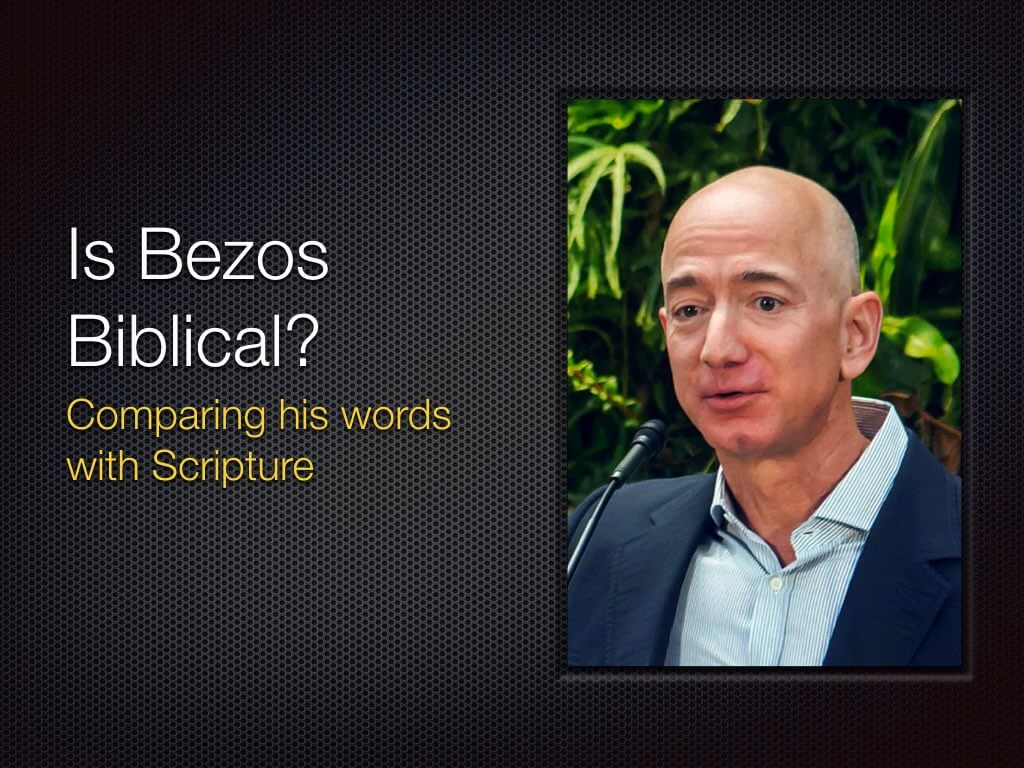
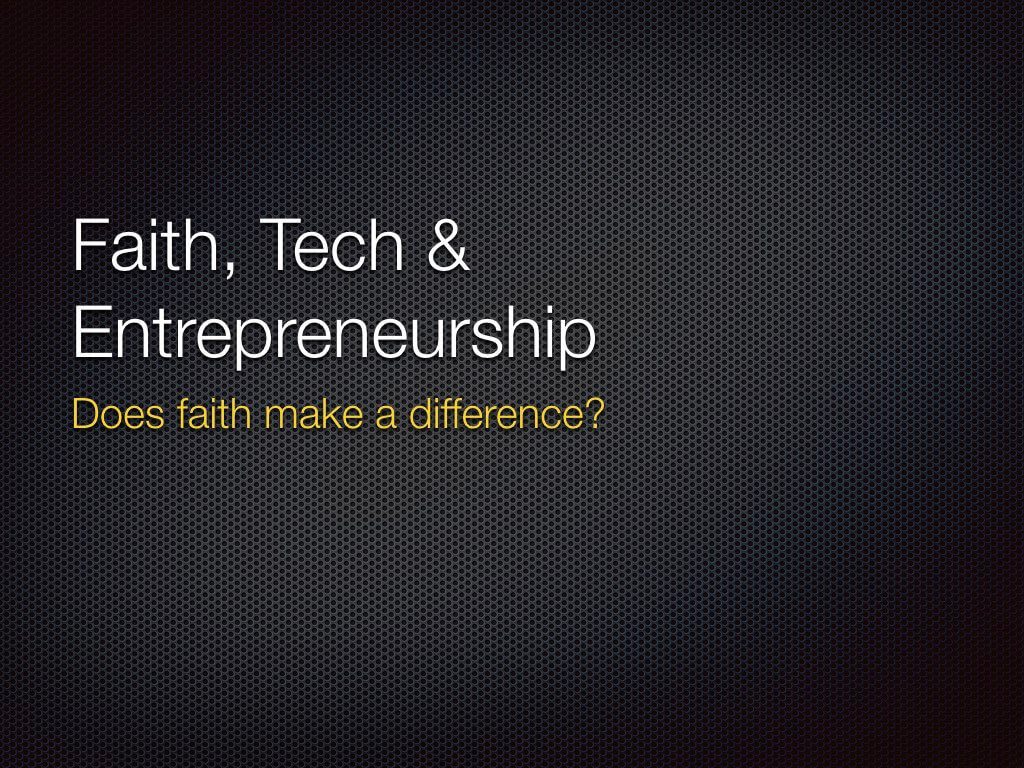
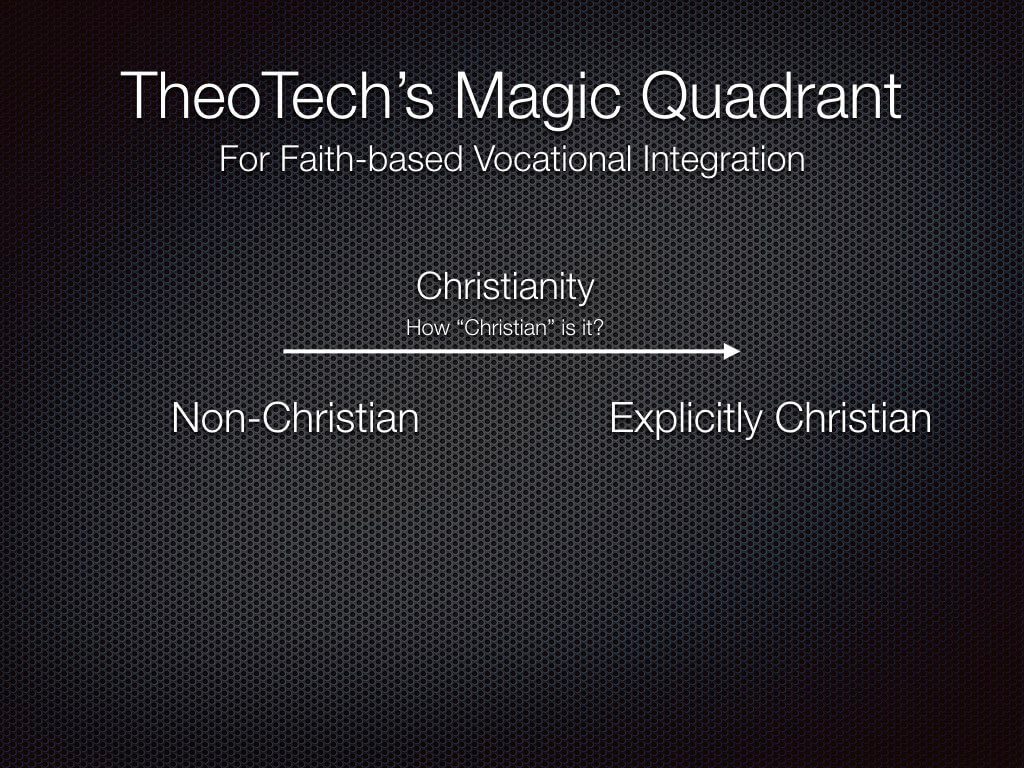
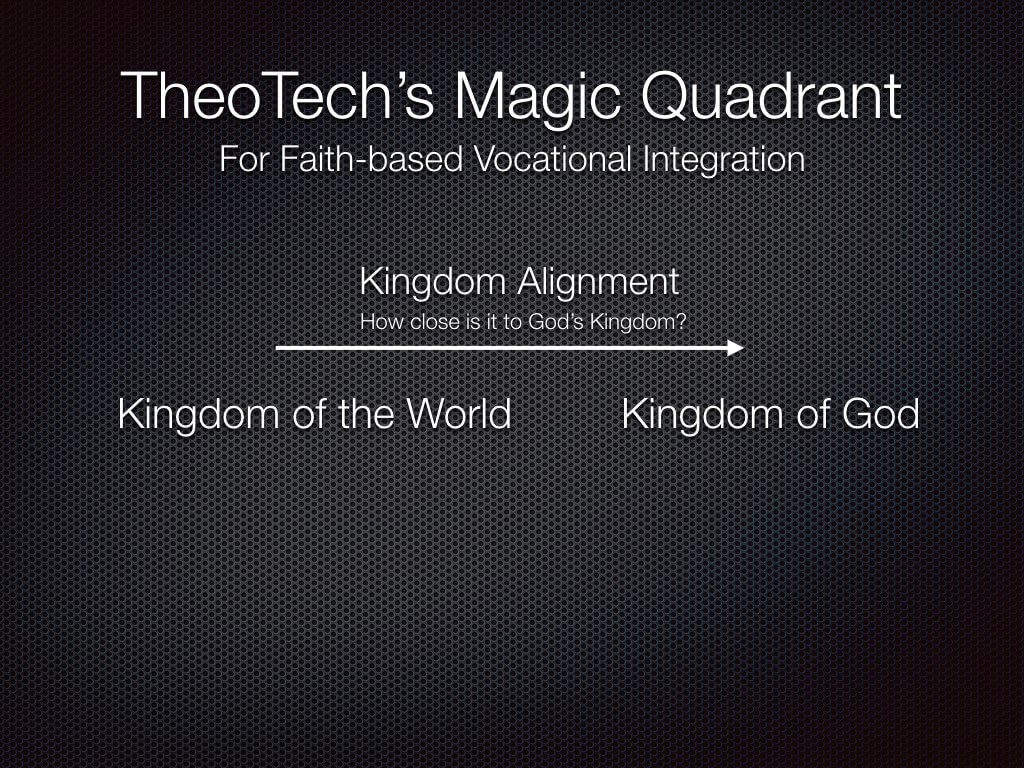
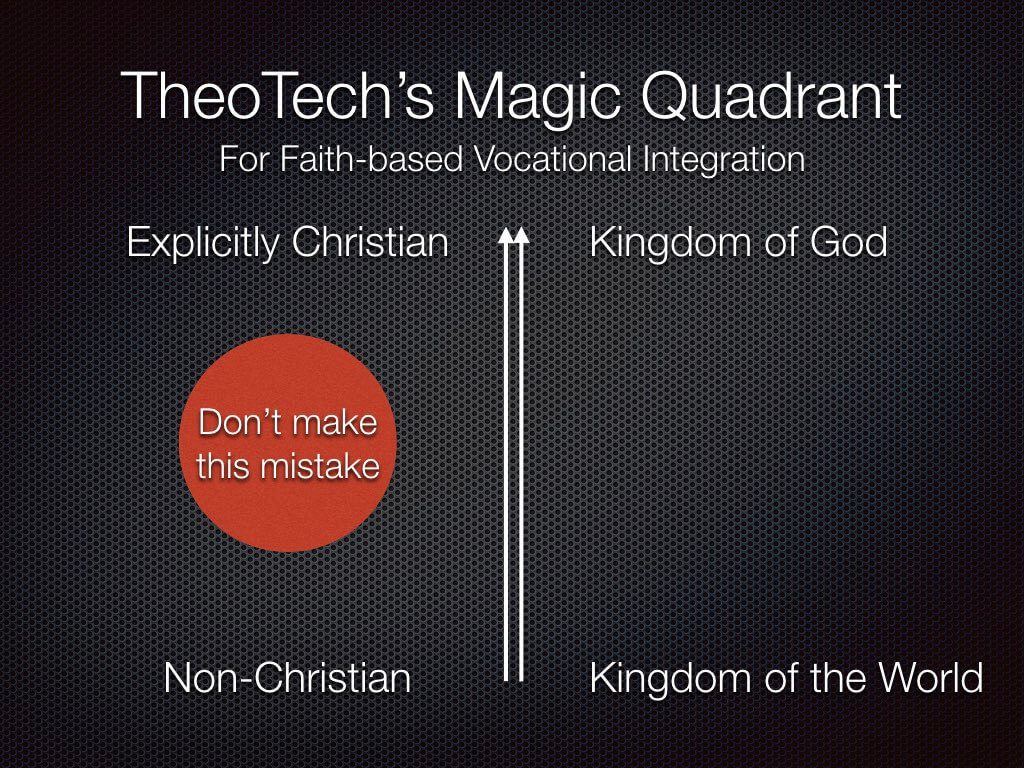
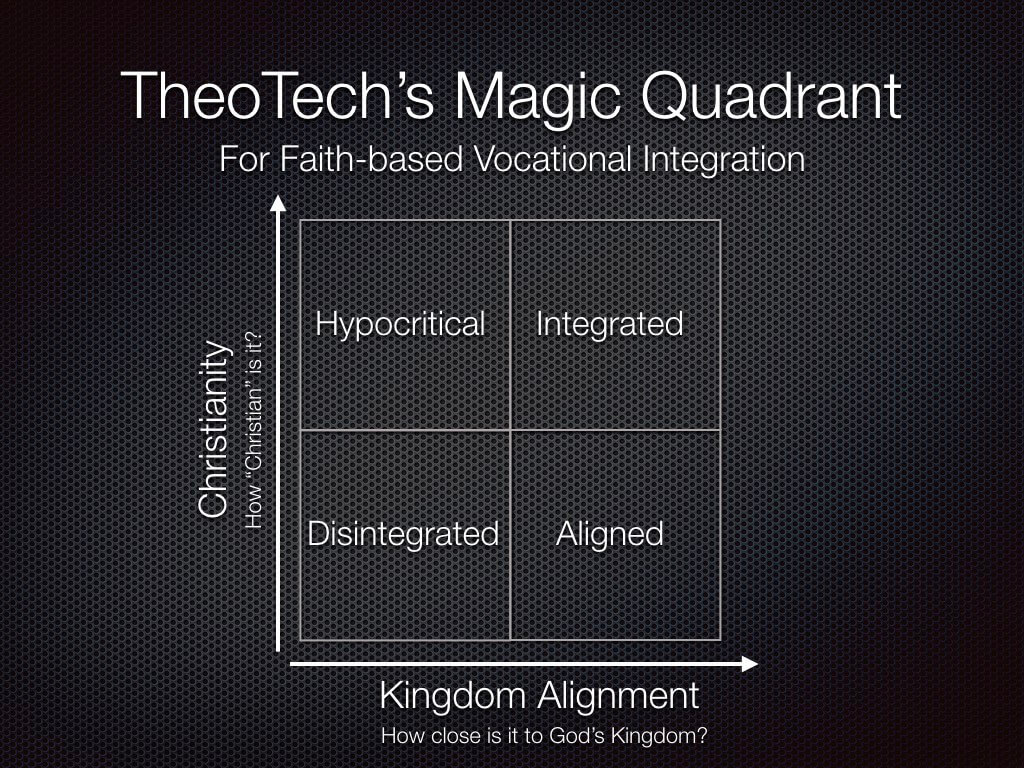
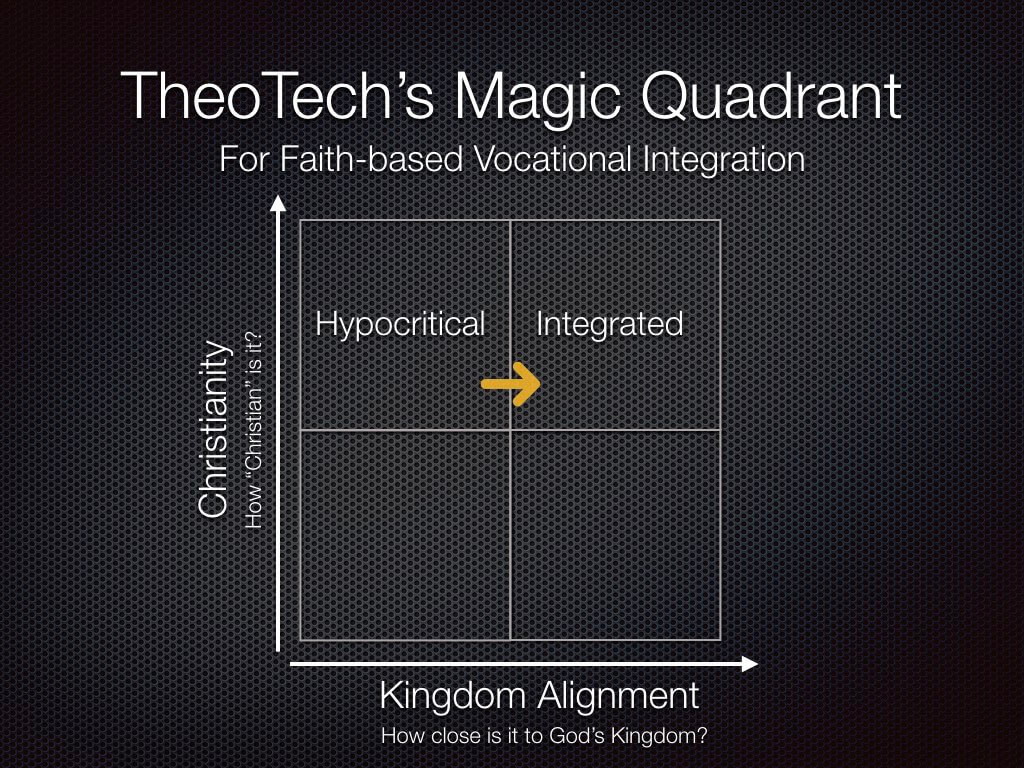
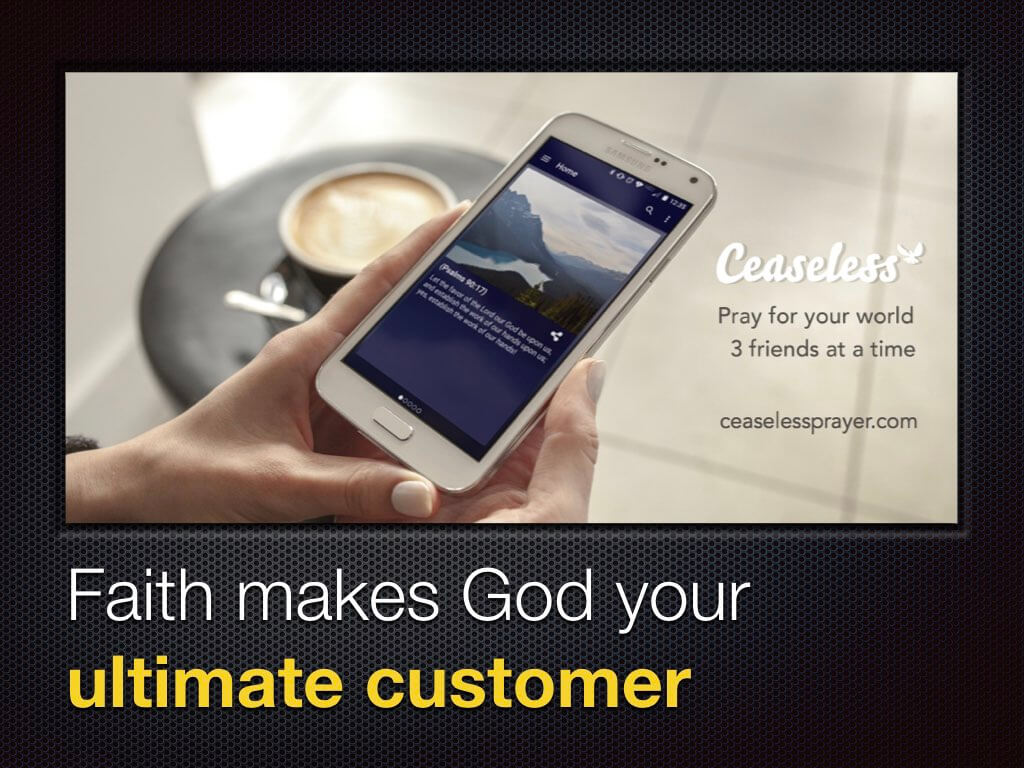
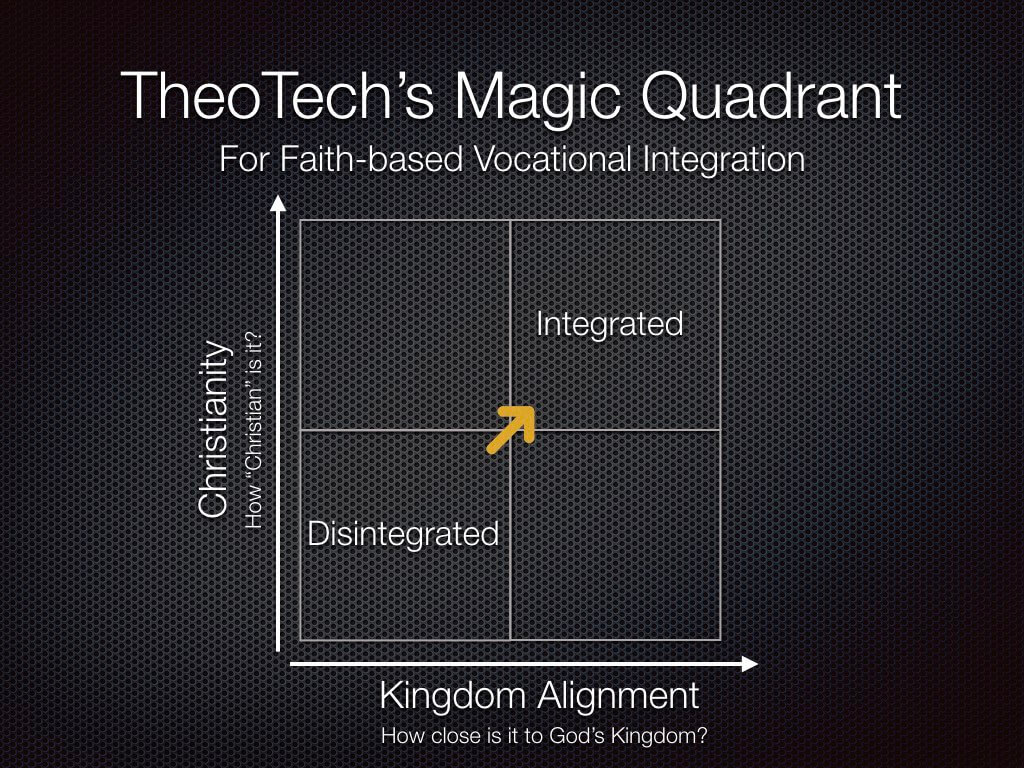
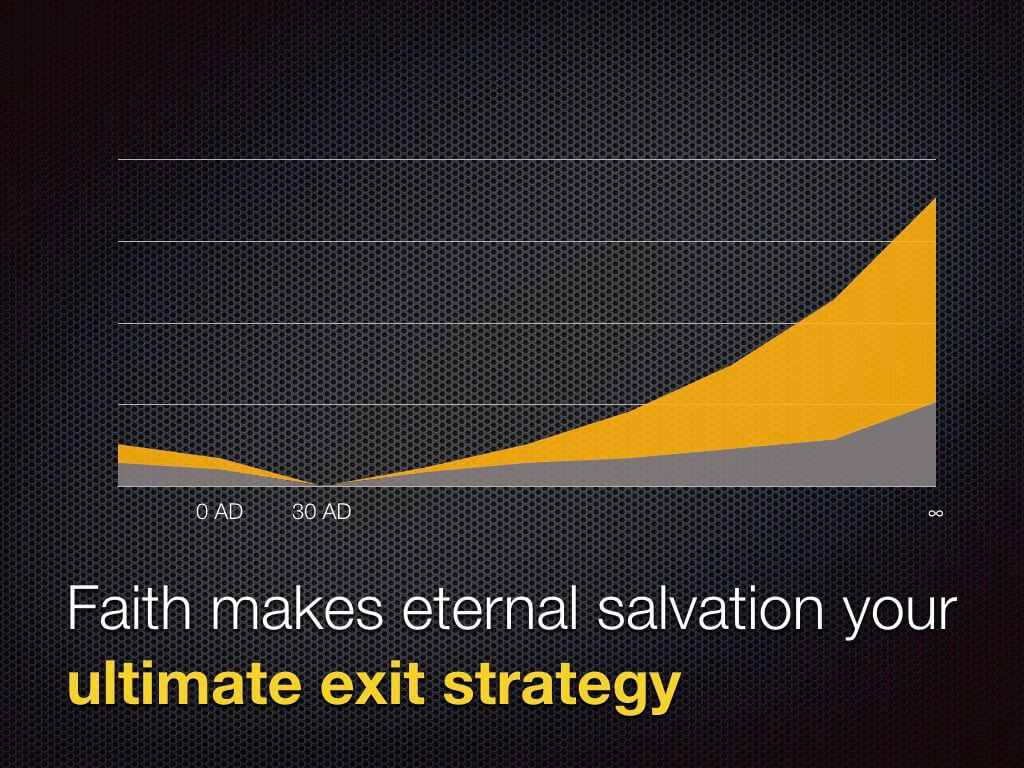
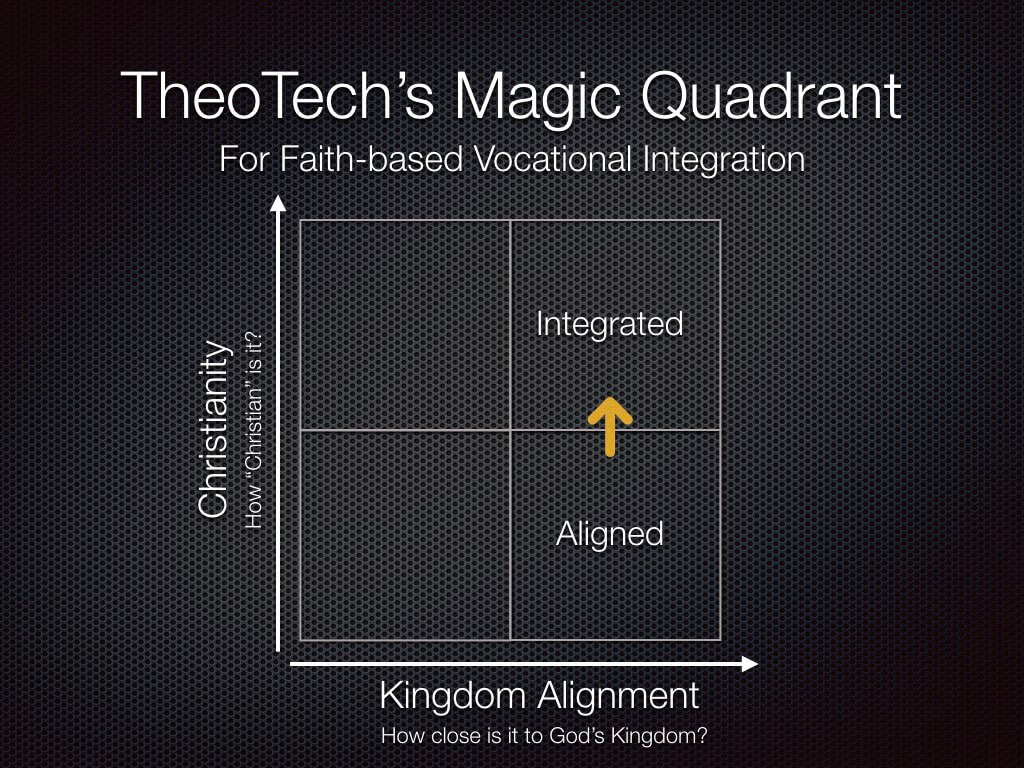
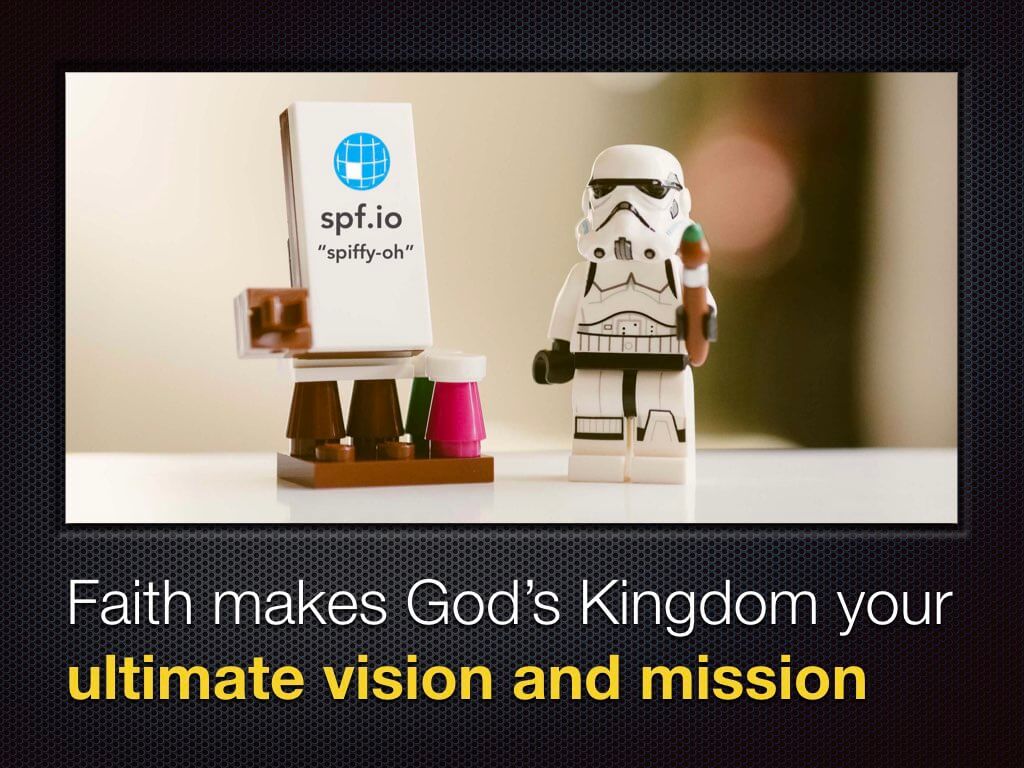
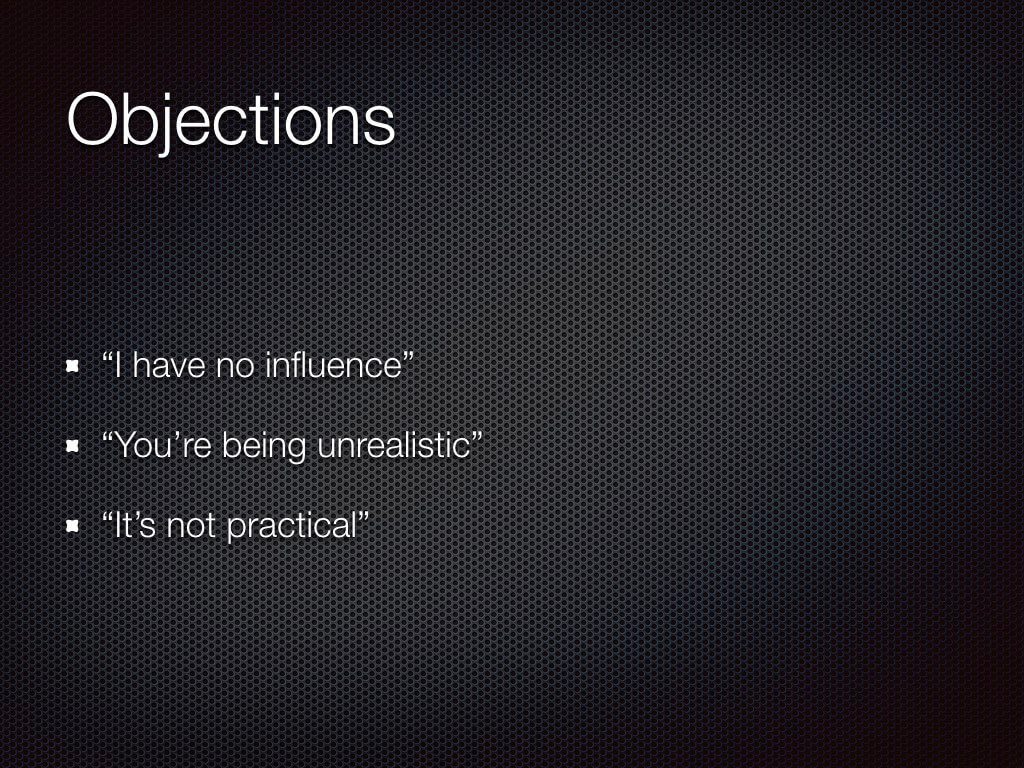
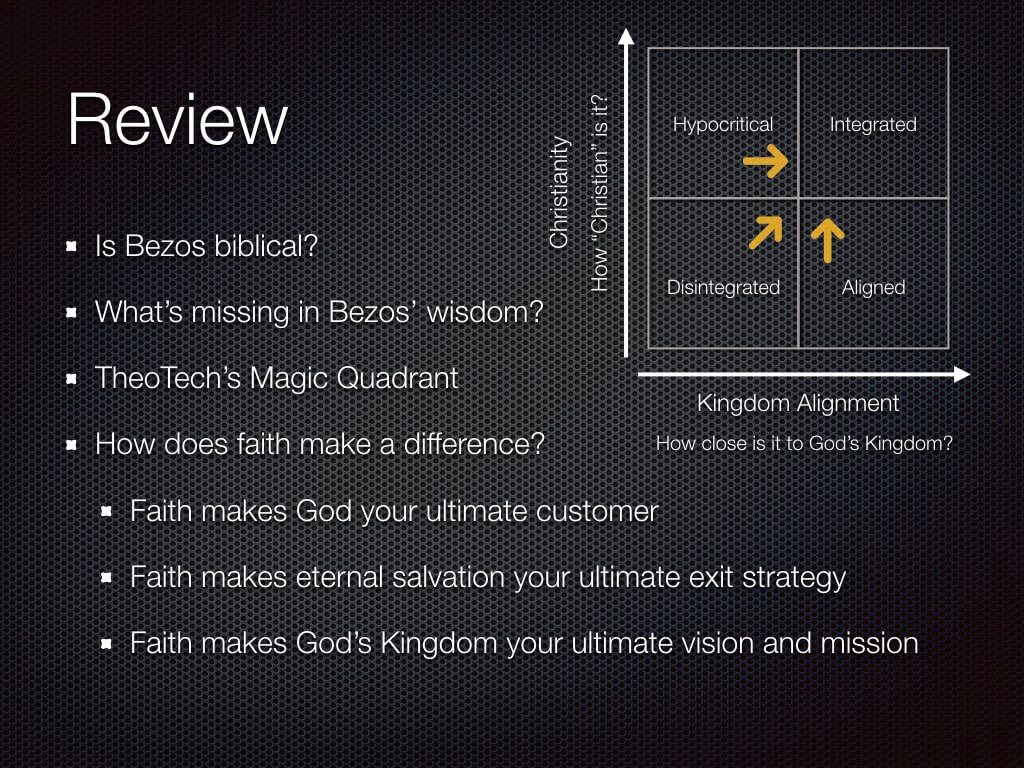
Leave a Reply